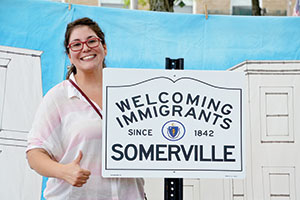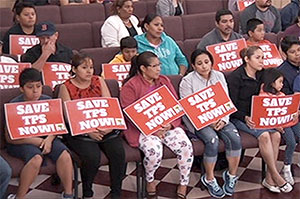
The city’s resolution asks the Department of Homeland Security to extend the Temporary Protected Status (TPS) program until 2019. ~Photo by Claudia Ferro
By Jordan Deschenes
The Board of Aldermen unanimously approved a resolution last week that called for the Department of Homeland Security to ensure the extension the Temporary Protected Status (TPS) program until 2019.
The document stated that the TPS program is “very much at risk” as in the wake of the Trump administration’s immigration enforcement policies.
A TPS is a specially designated immigration status that grants protection from deportation to foreign nationals who cannot safely return to their home countries. The resolution will be sent to State Representative Michael Capuano and Senators Ed Markey and Elizabeth Warren to help further discussion in Washington.
“This is a question of fairness and equity. The country was founded on immigration and immigrants built this country. As a grandson of Irish immigrants, this is a situation where we’ve lost our moral compass,” said Ward 3 Alderman Robert McWatters.
“We need to let the immigrant population in this country know that we support them and support their families, and that they are the fabric of our community.”
 According to BOA President William White, the special status – which was introduced as a result of the Immigration Act of 1990 – drew widespread attention in recent years as a result of the 2010 Haitian earthquake that killed over 300,000 people.
According to BOA President William White, the special status – which was introduced as a result of the Immigration Act of 1990 – drew widespread attention in recent years as a result of the 2010 Haitian earthquake that killed over 300,000 people.
TPS statuses are also granted to residents from nine other countries, most recently including Yemen, Nepal, and Syria. The Obama administration removed a federal “safety net” for the program to ensure that recipients find long-term employment. Consequently, TPS holders have been forced to work harder to support themselves.
“Folks should not be a position where this program is suddenly ended and they’re forced to be deported from their homes. Because they are actually here and employed, they contribute to social security and Medicare, for instance,” said White.
President White further acknowledged a large group of audience members whose countries of origin lie in war-torn regions of Central America such as El Salvador, Honduras, and Nicaragua. Several community members from the group were invited to speak about their experiences with the TPS.
Elizabeth, a legalized citizen and Somerville resident, stated that she has been living in the city for twenty-one years. Along with her husband – who has been granted a TPS – Montes has two children, both boys. Currently, the couple’s eldest son is planning on studying at UMass Boston to be a forensic detective.
“I am very scared because if my husband is deported, my kids will not be able to continue studying and he is an important part of our family,” said a Spanish translator speaking on her behalf. “This isn’t just (about) my kids: it’s also thousands of others – and so I thank you for your support.”
Also present were members of Centro Presente, a statewide Latino rights organization based in East Boston, although it was formerly located in Somerville. Members of the organization were also invited to speak before the Board.
According to Patricia Montes, Executive Director of Centro Presente, the organization helps over 600 people renew their TPS per year – many of whom live in Somerville and are from Central America. Montes stressed that many immigrants who hold a TPS have been lawful residents in the United States for many years and have been paying taxes.
“We need your support. Why? Because Somerville is a progressive city and right now, the TPS is under attack,” said Montes.
“I just want to encourage you to support this resolution and send a very positive and strong message to cities around the state and also to Washington D.C. to support people that are protected under the TPS.”
According to Alderman At-Large Mary Jo Rossetti, the city’s BOA plans on filing further resolutions if the federal government fails to recognize the demands set forth in the current one.












Huh? Elizabeth has been here 20 years &doesn’t speak English. Her husband never applied for citizenship? Send him back…sry…
I don’t know the situation regarding Elizabeth and her husband, so I won’t comment on that. But what I think there should be is some kind of free class offered to all immigrants, legal or not, to learn English, no questions asked.
There’s nothing wrong with anyone from another country being here, but I do feel that anyone who comes here needs to learn to speak English. If I were going to another country to live, I would have to learn their language in order to get around and function properly, get a job, do anything of importance. I can’t expect that country to accomodate me, I have to adjust to them. Not only that, but I’d be afraid to get around knowing that I don’t understand what people are saying to me, or that I can’t make myself understood to them.
I am the grandchild of immigrants on both sides, and they did learn English for the most part when they came here, and wanted to assimilate into American culture. It just seems a measure of respect for the country you are coming into to at least make some effort to learn their language, if not for the common sense necessity of being able to live and work among your adopted countrymen.
I could never be able to live in a foreign country without learning at least the most basic vocabulary. How anyone could live here for any length of time without knowing at least some English is amazing to me. Perhaps they have family members who translate for them, but that may not always be the case.
How can any immigrant be properly able to speak for themselves if they have to rely on an interpreter? Everyone needs to be able to voice their opinion, and being able to speak the language of the country they are living in is as much to their benefit as to anyone else’s.
It’s always a good thing when a foreign-born person is able to find places where their language is spoken. But they cannot rely solely on that if they are living where the predominant language is not their own.
If they are here temporarily, or permanently, it is in their own best interest to do whatever they can to learn to speak English as much as possible, and perhaps if there were free classes offered to all immigrants, it would encourage them to do so.
Somerville prides itself on being a sanctuary city, so it would seem only fitting that we also offer to help teach those same immigrants to live and communicate with us as easily as possible.
East Somerville Branch Library offers free English lessons. It’s popular, I’ve seen residents from all over the world attending.